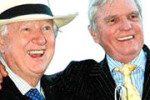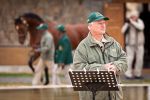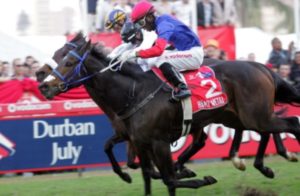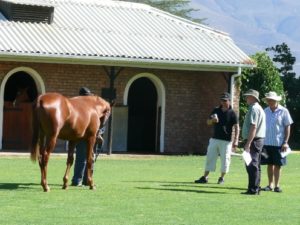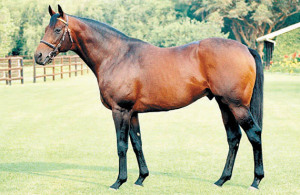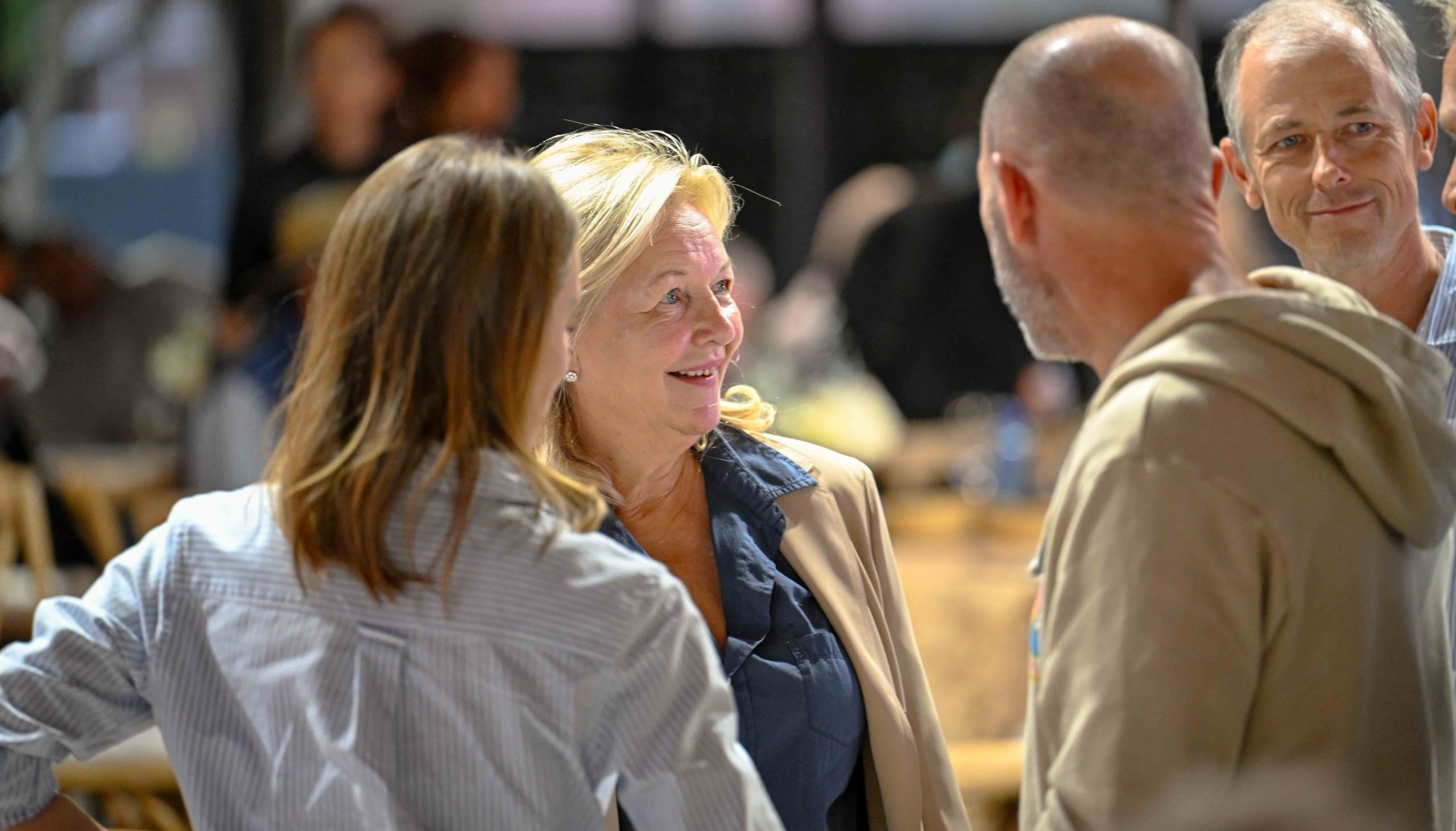I felt very honoured when Maine Chance Farms asked me to do a write-up on John Slade.
It’s a rather human peculiarity that we often save our best accolades and compliments about someone, sharing those only after that person has gone, which doesn’t make any sense. It is therefore a huge privilege for me to be able to honour John Slade upon his leaving Maine Chance Farms, to retire to rocky pastures out in the Karoo.
Most professions are referred to as practice. One practices medicine, dentistry and even veterinary science. However, those that manage stud farms, are called stud masters. I can think of no-one more deserving of that title than John Slade.
I have tried to write about John before and I confess, I failed, because how on earth does one condense a man of his stature into just so many words ? How does one tie someone – particularly someone who means so much to so many people – to any particular word, story or description? He is funny, charming, hugely knowledgeable, a wonderful story teller and – one of my favourites – a genuine horse lover. It is the singular privilege of meeting people like John, that makes my involvement in the racing industry so thoroughly worthwhile and I can say without reservation that he is one of my all-time favourite people.
John has dedicated his entire life to the art of breeding and has worked with some of the biggest and best in the business, not least of which is the mighty Silvano. So it seems appropriate to start with a breeding quote.
It is said that “A stallion’s pedigree tells you what they could be, its performance tells you what it should be and its progeny tells you what it is.”
Pedigree
If we were to judge a stud master on the same terms, John’s pedigree would probably not be considered ‘fashionable’ in racing terms. He is from an entirely non-equestrian family. Bloodstock agent, Chris Smith, kindly handed me one of my favourite John Slade stories.
When John visited his offices one day, hoping to collect some reference material, he politely announced himself with the greeting, “Hello, I’m John Slade.” “Who are you?” Chris shot back. Unacquainted with the peculiarities that rule the industry, and somewhat puzzled, John repeated “I’m John Slade”. “Yes, yes,” came the rejoinder, “but WHO ARE YOU?” John’s response was fairly succinct and rounded off with ‘And I didn’t go to Michael House either’ before he swept out.
In actual fact, John found his way into the horse industry only through the generosity of an Arabian breeder named Betty Chapman. Showing great kindness (not something horsey ladies are generally best known for!), Mrs Chapman introduced the young boy to her horses and encouraged his interest, and he eventually progressed to being a National show judge.
Performance
If one were to judge John on his performance, then the first ‘act’ in his professional life was as a teacher. After being booted out of the army for refusing to carry a rifle (“I didn’t see the point,” he muses), he trained as a teacher and taught art, a subject he is passionate about. It is a little known fact that John has an unusual visual impairment in that he sees objects in negative space, judging the spaces around an object, rather than the object itself. It gives him a unique perspective on art, on horses and on life and is perhaps the reason he is so good at judging balance and symmetry as well as viewing life from a slightly different perspective than most.
In typical John fashion, having found traditional teaching methods wanting, he tried out new ones. Although his methods were deemed unorthodox by the school, his students produced such fine work, that it became part of a travelling exhibition. Unfortunately it was not enough to reconcile him with the school principal and his tenure as a teacher came to a premature end.
John then decided to head abroad, doing a season’s stud work at Newmarket’s Cheveley Park Stud. Eschewing traditional application methods, John simply walked up the driveway and knocked on the door, and got the job! He then travelled to America, breaking in ready-to-run horses for the Hialeah Sales and prepping yearlings for Lee Eaton for the Saratoga Sales. He had planned to round off the tour with a stint in Australia and New Zealand, but a bad fall curtailed his plans and he returned home.
Back in South Africa, John got a job prepping a small number of sales yearlings for a breeder named Mr Jackson and did such a good job of it, that he caught the eye of George Rowles. George mentioned him to Robin Scott, who liked what he saw so much that he promptly offered John the job of stud manager at Highdown. Given the fact that Scott Bros were at the height of their powers, it was no small compliment, but John says “Robin is exceptional that way. He has helped quite a few people by giving them chances like that.” Although he was there ‘after Jungle Cove, but before Foveros’, it was during John’s tenure that Scott Bros attained the unique achievement of being second on the owners’ as well as the breeders’ log.
After eight years at Highdown, John was head-hunted by another captain of the racing industry, Summerhill’s Mick Goss. Mick had just taken sole control of the operation and John helped grow and develop the stud into the institution it is today.
Having spent eight years at Summerhill (“eight years seems to be my standard”), John was lucky to escape with his life, after a life-threatening encounter with a groom left him with a scar down the right-hand side of his face.
John took his young family off to New Zealand’s South Island for a few years, where they raised deer and practiced general farming for several years. It was a taxing job, performed under challenging conditions, but John believes that those deprivations have stood them in good stead for their Karoo retirement project.
In 1999 John was winding up the deer farming operation and preparing to accept a job at Waikato Stud on the North Island. He’d been standing a mare belonging to Anthony Beck and contacted Anthony explaining that he was leaving and enquiring what he needed to do with the mare. Hearing that John was back on the market, Anthony promptly offered him the job at Maine Chance and John took up the reins in September 2000. John worked for the Beck family until Andreas Jacobs bought the farm lock, stock and barrel – including its stud master – in 2002.
Since then John has been in charge of the phenomenon that is Silvano, the triumphs and tragedy of Victory Moon, Black Minnaloushe’s triumph in producing South Africa’s second Triple Crown winner and of course the icing on the cake, the first three past the post in the 2015 Vodacom Durban July. On top of the Maine Chance Farm’s many achievements, John has produced Gr1 winners for his own account too. You bet, these days there aren’t too many people who need to ask who John Slade is.
Progeny
To judge John by his tangible achievements and weigh the rands and cents of sales results or the silverware in the racing trophy case, is to miss his real legacy, for John is respected as much for what he does as who he is.
So what of the man? Probably the best way to describe John would be to watch the whole of Neil Gaiman’s wonderful commencement speech ‘Make Good Art’ in which he encourages the students to, “go and make interesting mistakes. Make amazing mistakes, make glorious and fantastic mistakes. Break rules, leave the world more interesting for you being here. Make good art.”
In a nutshell, that’s what John has dedicated his life to. He is fearlessly curious about how things work and how to get them to work better and it is this insatiable curiosity that gives him such an active mind and makes him such fun to be around. He has a good idea of what works, as well as what doesn’t, without being married to either – or both. Which is remarkably liberating (“I’ve always been a hippy,” he shrugs). He is not afraid to ask questions or question the answers. It’s not anti-establishment, so much as anti-accepting things just because that’s the way they’ve always been done.
John is aware of, but remains wonderfully unperturbed by, convention and popular opinion, preferring the courage of his own convictions to the tepid opinions of others. He is not afraid to challenge the status quo, to experiment and try things out for himself and, above all, to fearlessly make mistakes – occasionally wonderful mistakes, which have produced the likes of Heavy Metal.
In an industry ruled by smoke and mirrors, John is wonderfully, ruthlessly honest. This is mainly because life is short and like most people, he doesn’t have time to waste, but also because in an industry which lives and dies by rumour and reputation, your name means everything. It is an attribute that has rightly earned him a reputation for absolute integrity and which makes his opinions sought by the best in the business.
After the July, he joked that he was getting quite a tan from all the limelight, which is typical John humour and also shows that he is a lot more comfortable behind the scenes than in the front row. John is one of the rarest of human beings who know that one leads best by serving.
In the same way that his deft touches can still be seen at Scott Bross and Summerhill, John has always focussed on leaving a legacy that will last long after he has moved on. Godfrey Gird left little to do in terms of the Maine Chance Farms’ aesthetics, so John has poured his energy into his colleagues and staff. John does not suffer fools gladly, but has infinite patience with anyone who wants to learn. Like the great Monty Roberts, he doesn’t want his students to be as good as him, he wants them to be better and John will tell you proudly that every single one of his stud staff can foal a mare better than 90% of the stud managers in the country.
On their part, the staff members are proud to say how Mr Slade always looks out for them and helps them plan for their futures. Maine Chance was one of the first stud farms to invest in courses for their staff and one of the first to initiate a grooms co-op. There is a bus to take the staff children to school and shiny new cars parked outside most of the neat staff houses.
John has spent his life serving his employers, his colleagues and more than anything, his horses. A good stockman knows his animals intimately and John’s horses are his friends, his industry and his greatest reward. He is unselfconscious in his affection for them, describing Silvano as “everyone’s friend and father and the sort of horse you tell your secrets to.” It’s a matter of pride for John that he is there for every covering as well as for every birth. “Every single one?”, I once asked incredulously. John looked vaguely affronted before answering, “No-one else opens my Christmas presents!”
It will be sad not to have him just up the road anymore, but the commemorative frame with those July saddle cloths in the Maine Chance Farms reception area stands silent sentry to the fact that John Slade was there. His association with Maine Chance Farms and his contribution to its many successes, will always form part of the proud history of the farm.
It is the closing of a chapter, but happily John now has the chance to move on to the promise of new adventures. And to borrow from the irrepressible Neil Gaiman again, I know that whatever he does going forward, John will make good art.



